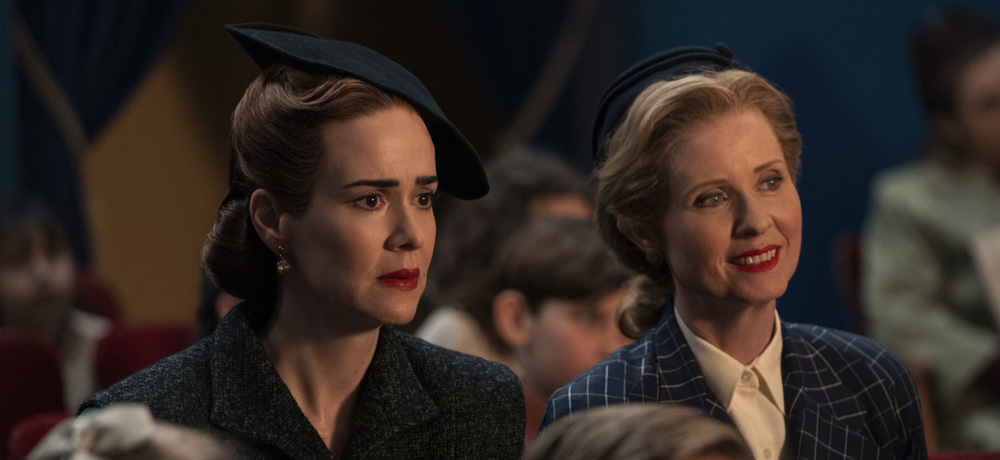


The latest series from producer/showrunner Ryan Murphy, Ratched, is set to debut later this week on Netflix. Centered around the titular nurse from One Flew Over the Cuckoo’s Nest, Ratched gives us a look at the life of the iconic character during the 1940s, and features Sarah Paulson as the series’ namesake character. One of the key figures in Mildred Ratched’s life during this time is Gwendolyn Briggs, played by Cynthia Nixon, who is a newcomer to the world of Ryan Murphy.
Nixon discussed her experience collaborating with Murphy for the first time, saying, “It was kind of mind-blowing. It was really exciting to get invited into the world with so much talent actor-wise, but really design-wise, camera-wise, writing-wise, every-wise. And it was wild, too. Sometimes Ryan, when he was directing, was on the set and then—obviously—sometimes was not. We’d been working together for a very brief amount of time and he shared with me a not-quite-final cut of this documentary he did called Secret Love about these two women who were a couple for decades and hid it from their families. I mean, it was just mind-blowing because, like so many Ryan Murphy things, you think you understand what he does and then you see a whole new project that is just a new chapter. It’s not even a new chapter. It’s like a whole other book in a whole other language.”
“But I guess the thing, apart from enjoying his direction and being with him on the set, was watching all of the other things that he was doing, like his children coming to visit. Or they were setting up a shot and enormous billboards of the new clothes from Pose are being paraded out to be approved. Oh, now there are storyboards coming for a whole new show he’s developing. Just to have so much as a glimpse in his direction of all of these things, he contains multitudes. Literally. And to see that in action was mind-blowing and wonderful.”
Another draw for Nixon to coming on board Ratched was her character in the series, Gwendolyn Briggs, who works in politics, but is also harboring a secret that could be very detrimental if revealed during the era that this story takes place in. “She's a really interesting character and very different than the usual kind of things I'm asked to play, I would say. Particularly as I've gotten older in the last 10 or 15 years, I've been asked to play a lot of what would politely be called ‘complicated people,’ but sometimes bordering on malevolent. The thing about Gwendolyn is she's so wholehearted, she's so pure, she's so confident, and she's up against so many odds. She's a queer woman in 1947, she's trying to make a life for herself in politics, all of these seemingly impossible tasks that she sets for herself. But she moves ahead seemingly without fear.”
“So, for me to be basically the only person, really, to wholeheartedly be an advocate, was just very different for me. And also, it was just a real challenge to particularly not have so many little cul-de-sacs to go down of a "complicated character," but just someone who was so whole-hearted, and who she was. And to do that was a delightful challenge. Almost every other character has many different parts of themselves that they're trying to kill or stamp out or suppress, and Gwendolyn is really the opposite. She knows that she has at least four or five pieces of her personality, but meeting Mildred is the key that unlocks the door, where she realizes she actually has to integrate all these parts of her personality and thinks for the first time it could be possible.”
Because Ratched deals with the themes of mental illness, social repression, and sexual identity, Nixon discussed her feelings about the series’ storylines that confronted the controversial treatments by medical professionals of that era.
“One of the obviously overarching themes of Ratched is not only the brutal treatments that were used against people who were deemed mentally ill, but what fell under the umbrella of mental illness, and what was defined as mental illness,” explained Nixon. “And certainly being queer is front and center, and we have so many different examples of it in the story, but we have characters who have turned to murder because literally that was the only way they could survive, or developed other personalities as a way to not just sink and disappear and self destruct.”
“And to me, one of the most saddest things that we see in the show is a character played actually in real life by Jon Jon [Briones]'s real son, who is a boy who is forced to undergo a lobotomy because he daydreams. Obviously, we have all these gay examples of characters who are persecuted for their gayness, but I think the bigger umbrella is people who, for whatever reason, their behavior doesn't fit in a very narrow acceptable box during the 1940s, and what our medical establishment chose to do about it.”
---------
Visit our online hub to catch up on our previous coverage of Ratched!